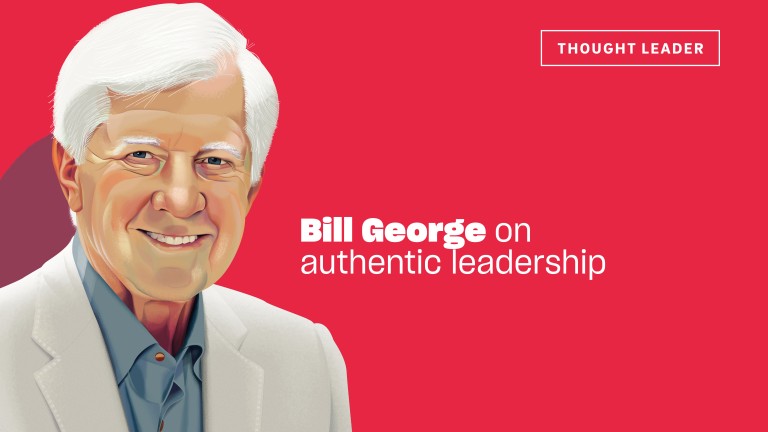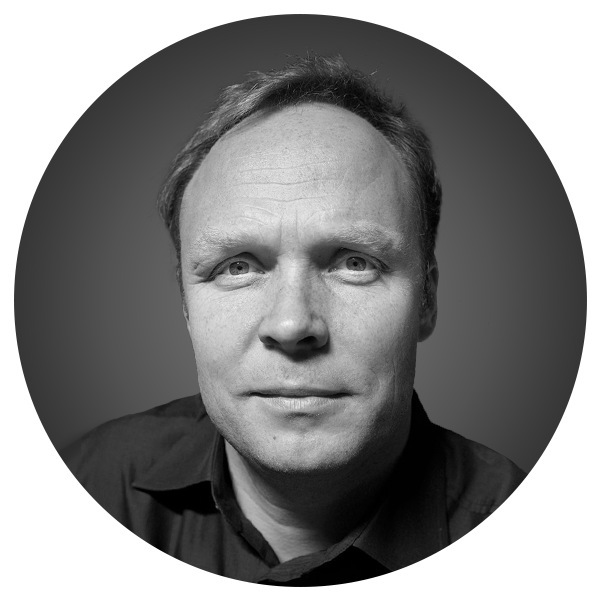Performance: Faster, Higher, Stronger
![{[downloads[language].preview]}](https://www.rolandberger.com/publications/publication_image/ta40_en_cover_3_download_preview.jpg)
Think:Act explores all factors related to performance for individuals and teams, with insights into metrics, AI, experimentation and authentic leadership.


Former Medtronic CEO and renowned Harvard Business School professor Bill George thinks it’s time for a new generation to take over as executives. Uncertain times call for authentic and servant leaders who value inclusivity, adaptability and flexibility – and who aren’t afraid to get their hands dirty on the frontlines.
You stepped down as CEO of Medtronic in 2001 after 10 years at the top. Do leaders have an expiry date?
I made the decision to limit my tenure as CEO to 10 years before I took the job because my studies show that CEOs who stayed more than 10 years and never leave their companies didn’t do as well in the next decade. And Medtronic is a very innovative high-tech company. I feel that, for creativity, you need a new leader every decade.
You’ve updated True North, your widely acclaimed book about finding one’s path, with an “emerging leader edition.” Why do we need new leaders now?
We need a whole new generation to take over. We’ve had the Baby Boomers in charge for the last 30 years. The order of the day has been command-and-control as General Electric’s CEO Jack Welch and many disciples practiced. That’s not going to work today because Millennials will not work for someone like that. They want to be empowered, they want to be inspired, they want to have an opportunity to show what they can do in their 20s and 30s. Also, we have gone from areas of relative stability back in the 1990s to one crisis after another. That means we need a different kind of leader who knows how to lead in a crisis, who can be very adaptable and flexible and knows how to motivate younger employees.
Bill George is the author of four bestselling books including True North and Authentic Leadership. He is a professor of management practice at Harvard Business School, where he has taught leadership since 2004, as well as serving as the faculty chair of the school’s Executive Education program, Authentic Leadership Development. He has served on the boards of Goldman Sachs, EptonMobil, Novartis, Target and the Mayo Clinic.
What makes you confident that the CEOs that will come from the Millennial generation, or even Gen X and Gen Z, will be up to that task?
I know a lot of GenXers and Millennials very well, not Gen Z as that generation hasn’t defined itself yet. These people are exceptional leaders and know how to be flexible. Among this new generation are people like Indra Nooyi [former PepsiCo CEO] and Microsoft CEO Satya Nadella. They are Baby Boomers, but they’re really the role models for how the new generation should lead.
What’s your definition of authentic leadership, a phrase you coined?
I’ve always felt authentic leadership is about competence, capability, knowledge, and most of all the ability to empower people, not exerting power over them, which was the mantra back then. I developed the notion of authentic leadership where you have clarity of purpose, a clear set of values that you practice, and you build long-term, deep relationships. Authentic leaders are genuine. The most challenging question is knowing who you really are. A lot of leaders don’t, and they try to change the world before they’ve figured out who they are, what they want out of life.
Jack Welch has recently come under intense criticism for his leadership style. Malcolm Gladwell, for instance, pointed out in The New Yorker that “as the head of General Electric, he fired people in vast numbers and turned the manufacturing behemoth into a financial house of cards.” What are your thoughts on that legendary CEO?
We’re being very hard on Jack right now. He was a man of the 1980s who envisioned what it meant to compete globally back then. And he put it into effect. Frankly, he did all the right things to make GE competitive, it was bloated. Yes, he had to lay off a lot of people. He did an outstanding job, but he stayed too long and got too caught up in what I call the charisma trap – trying to be the CEO of the century or something like that. Today, we look at these things very differently. Most significantly, we look at labor or people as our greatest asset, not as a cost. The flaw in the thinking back then was that frontline people were considered to be a cost. That has totally changed, and those who carried on Jack Welch’s ideas into the 2000s have not been successful.
The leader’s journey you detail in your work encompasses personal introspection and experiencing a crucible to finally mature into a servant leader. That sounds a lot like the classic hero’s journey …
Joseph Campbell wrote extensively about the hero’s journey. I’ve read his work and admire it. But I think the leader’s journey is somewhat different because the hero thinks the journey is all about himself or herself. That’s classic Greek literature like The Odyssey. An authentic leader today, by contrast, is primarily a servant of the people that work with him or her. That’s the key. You have to flip the switch and go from being an “I” leader to a “We” leader. It’s quite different. A lot of people start out on the hero’s journey – no doubt I did that too in the early days. You think you will conquer the world, but you have to realize it's really all about serving the people, your customers, your employees and, ultimately, your investors.
Growth will add layers of complexity to your “onion” as you develop new ways of interfacing with the world. You may still uncover some blind spots between the layers, however, so never hesitate to ask for feedback from someone who cares about your success.
Can you elaborate on the distinction between the “I” and “we” leader? What are some of the key steps that somebody needs to learn along the way?
A typical “I” leader focuses on himself, his power base to exert power over as many people as possible. He is more focused on money, fame, position and title. They expect people to follow them and follow directions. When things go well, they take the credit and when things don’t go well, they blame someone else. A “we” leader is trying to empower other people to become their best selves and perform to their full potential. If there’s a problem, the “we” leader takes responsibility. If things go well, they give credit to their team. That lets them build great teams of people who are really inspired around a central purpose. Instead of being money-driven, they’re purpose-driven.
You also talk about anti-leaders, the people who you argue don’t really have this internal moral compass. You specifically call out Facebook founder Mark Zuckerberg, Uber’s former CEO Travis Kalanick, WeWork’s Adam Neumann and the disgraced founder of Theranos, Elizabeth Holmes. Where and perhaps more importantly, why did those people go astray?
Many of these leaders, like Mark Zuckerberg, started young and never solidified their values and their clarity of purpose. They were successful, became wealthy early and got too caught up in this. We see this happening with other leaders as well. People like Elizabeth Holmes were fraudulent from the beginning while Zuckerberg created a very real thing, but he’s having real trouble now deciding what he wants to be because there’s no clarity of values. I think the key is having clarity of values and putting the institution’s interests before your own.
How would you characterize Elon Musk’s type of leadership? He admitted after the messy Twitter takeover that he’s in over his head and can’t seem to catch a break.
Musk is an absolutely brilliant person. I would say he’s the greatest inventor of our time, going all the way back to Thomas Edison. What he’s done with Tesla is spectacular. Every automobile company in the world – German, Japanese, American – is trying to catch up with Tesla, and that also applies to what he’s done in the battery business to get costs down. And look at what he did with SpaceX, he’s rivaling NASA in the United States. So, I give him huge credit. Now, why is he fooling around with Twitter? I think he’s got too caught up in his public image and stepped into the charisma trap.
"We need to put frontline employees on top and have all the corporate staff supporting them so they can do their job."
Most of these leaders going off the rails are fairly young. You, by contrast, were 46 when you found your sweet spot, the place where personal purpose and company purpose aligned and clicked. Perhaps great leadership is simply a function of aging and becoming more mindful of our surroundings?
There’s a lot of truth in that. I should say that I was given an opportunity at age 27 to become general manager of Litton Industries’ microwave oven business when there was no market. I had to create something as an intrapreneur inside the company. It was a great learning sprint and I surely made mistakes. But we have to have those experiences and rub up against the world before we can fully take charge. Many of us will get them by the early 40s.
There’s also the other side of the equation, the people you serve in that role. How have employees changed as new generations have entered the workforce?
Every employee post-Covid is wondering: Do I want to work here? Is there a purpose? Does your company have a plan for climate change? And, ever since the murder of George Floyd, do you have a diversity, equity and inclusion plan? For 30 years, we have devalued the role of frontline employees. Their compensation has gone down relative to executives, not just CEOs. This is a disaster, in my opinion. We need to flip the organization chart, put frontline employees on top and have the CEO and all the corporate staff supporting them so they can do their job. Think of any service industry. Whom do you see on an airline? The frontline employees. Who is it that’s so concerned about the quality of a Mercedes or a BMW? A well-trained frontline employee. And in Medtronic, frankly, I could learn more about quality talking to frontline people than I could from the quality department. Because they were the ones making the products, they knew the problems of the equipment. They knew what the issues were.
What needs to change with corporate culture and leadership styles to address this imbalance you just described?
First of all, I think corporate executives need to get out of their offices and be with their customers and employees. We did a survey of CEOs at Harvard and we found that they spent 72% of their time in meetings with their direct reports. You really aren’t learning the business when you do that. They only spent 5% with their employees and even less – 3% – with customers. If you’re running a large retailer, how do you know what’s going on unless you’re walking to the store floor every day, every week? At Medtronic, I witnessed over 700 procedures, putting on the green gown, going in there and just watching doctors. I didn’t do anything, but I learned a lot. That’s the frontline. I think it’s important to be in the R&D labs with your scientists and engineers, not just getting reports on what’s happening in innovation. That’s key if you want to stimulate people to do great work and learn what’s going on. Because a lot of the best ideas are at the frontline but get depressed because of budgetary reasons, bureaucracy or approval levels. Creative companies are the ones where the CEOs are out there all the time.
Some consider today’s crises a maelstrom of interrelated challenges that throw society and the economy into turmoil. How does one learn to manage or lead in such times?
No one is really trained to do this because you only learn by being out there, experiencing a crisis on the firing line. It’s like a war. I think there’s a big change, and people that think we’ll be returning to normal times won’t make good leaders. Again, you have to be out with your people and experience these crises. That’s how you determine what’s going on and how to deal with it. Today, as a leader, you have to be extremely adaptable and flexible. While you need a vision of where you're going, you also need to tack back and forth all the time like a sailor.
Have we fundamentally changed the way we train future leaders from what’s taught at business schools to how companies handle their internal talent pipeline?
Business schools are way behind in teaching leadership. They’ve been turning out a million managers in the last 20-25 years, so we now have too many managers and not nearly enough leaders, and business schools need to focus much more on leadership. Now, companies have made a big change in the last five years, shifting almost entirely to authentic leadership and moved away from power-based leadership, away from the mantra of maximizing shareholder value and just training a bunch of people that are financially very savvy. Today, the focus in corporations is how you lead people, not just how you manage numbers.
"Everyone needs mentoring and coaching. Leaders today need someone they can talk to because it’s a very lonely place to be."
When we talk about handing over the reins to a new generation, to what extent do we risk throwing out some best practices and valuable knowledge from the old leaders?
I retired from Medtronic on my 60th birthday, but I’m still going strong because I believe that you’ll become more of a mentor and guide for the younger generation. Everyone needs mentoring and coaching. Leaders today need someone they can talk to because it’s a very lonely place to be. That’s the role more senior leaders can take serving on boards, and being coaches. We shouldn’t throw out a lot of the ideas.
Which ones should be pitched, then?
One idea we’ve moved away from is the idea of maximizing shareholder value. The key value is to maximize the value to our customers. That’s what motivates our employees. They are not just driven by compensation. They’re motivated by doing an outstanding job in some way, either creating a product, producing great quality, serving customers firsthand. They’re the ones that make the difference. But we have lost sight of how to motivate them and the vital role they play. This new multi-stakeholder model can be complex because employees today have agency and want to be heard. At Starbucks, Laxman Narasimhan is taking over as CEO in 2023, but it’s very much Howard Schultz’s company. He created the quintessential employee-oriented company but 160 stores have applied to become members of a union. That’s because they lost touch with their employees.
Over the last two, three years, the term “workplace” has taken on a radically different meaning. How does one lead and engage employees when a lot of people don’t even want to come to the office anymore?
There’s the notion that 60% of the workforce has to be on the job. You can’t start a production line, you can't have breakthrough science and engineering. But for the remaining 40% that are office workers, workplace flexibility is key. It doesn’t benefit young people never to come into the office because how will they be mentored? Creativity and innovation take place through a team of people coming together in-person and spooling ideas out, not just from one genius inventor.
![{[downloads[language].preview]}](https://www.rolandberger.com/publications/publication_image/ta40_en_cover_3_download_preview.jpg)
Think:Act explores all factors related to performance for individuals and teams, with insights into metrics, AI, experimentation and authentic leadership.




